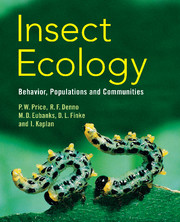Part II - Behavioral ecology
Published online by Cambridge University Press: 05 June 2012
Summary
Contents
Behavior links the organism to its environment. At every moment of the day and night behavioral responses to environmental cues, and internal drives, guide an individual through its often perilous existence. Behavior determines success or failure in the efforts to reproduce. Discovering the many cues that insects use to inform them of their environment, and their responses to these stimuli, is an ongoing pursuit of behavioral ecologists. This is because insects can be much more specialized than humans in the cues employed to locate food, and cues that stimulate feeding. Indeed, the ways in which they relate to their surroundings is often notably different from we humans. As a result, behavioral ecology is a broad and fascinating subject which reaches well beyond this section of the book, into on species interactions and other parts of the book.
- Type
- Chapter
- Information
- Insect EcologyBehavior, Populations and Communities, pp. 25 - 26Publisher: Cambridge University PressPrint publication year: 2011

